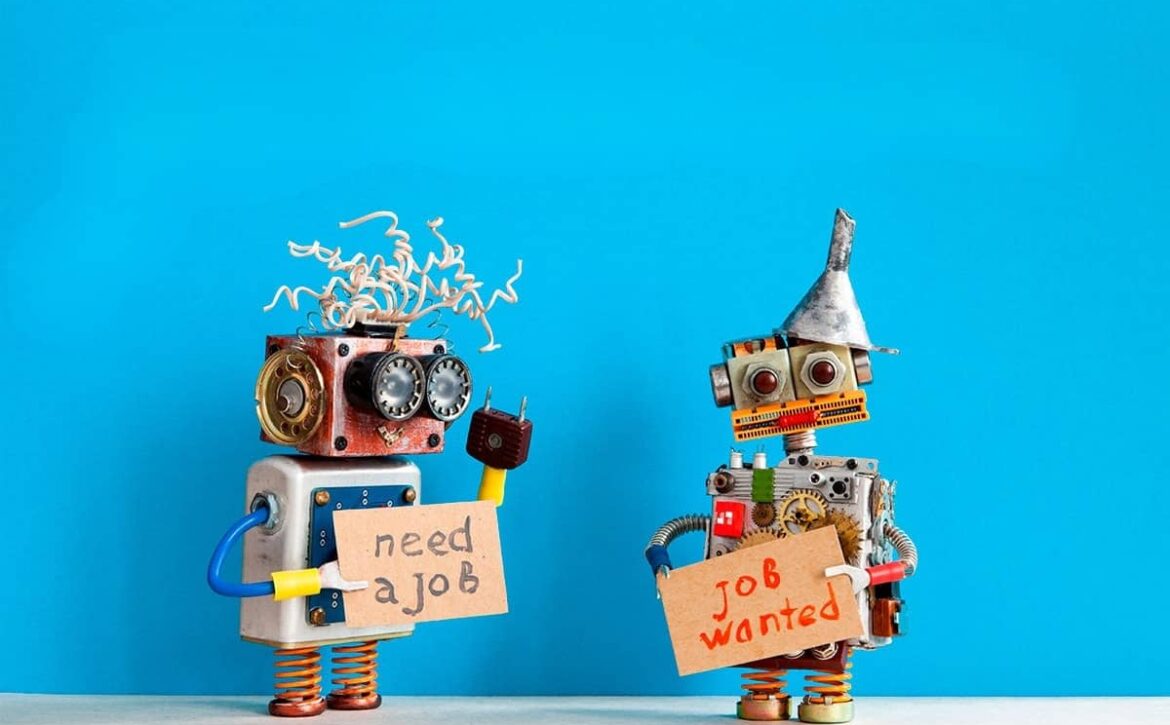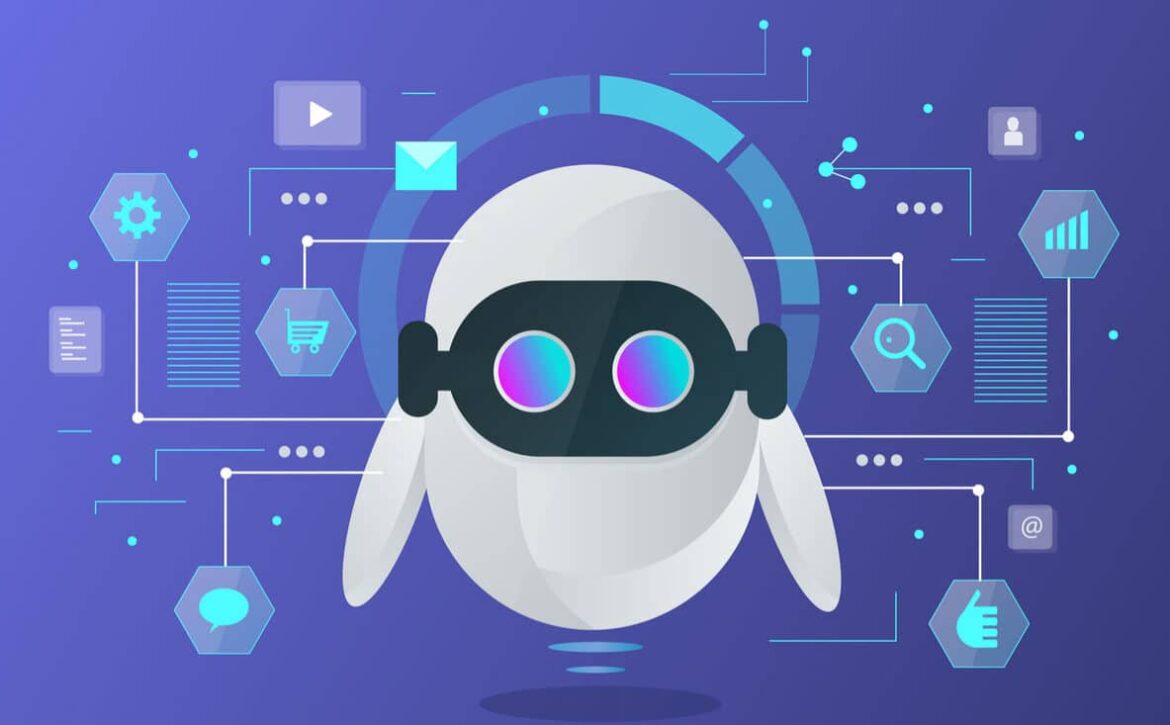Will AI Replace Digital Marketers? Find out if your job might disappear
The use of artificial intelligence (AI) is definitely causing concern in a number of different industries.
According to some, it will also fundamentally alter how marketing and sales are carried out, causing a shift in the demand for digital marketers.
However, the precise impact of AI on digital marketing roles over the coming years is still not well understood.
What is certain is that creative individuals will continue to be needed to implement current practices along with the requirement to develop better and better marketing tactics.
But at the same time, marketing’s use of artificial intelligence is gradually growing.
Why is this happening?
AI is becoming more and more appealing every year as a result of the daily increase in the amount of data that is available and the methods for gathering, analyzing, and using that data for marketing and advertising.
The attraction of AI and marketing automation will also grow as more businesses gather human resources with expertise in data science and market analysis.
Will AI eventually replace digital marketers? To find out the response, continue reading.
First of All, What Is Marketing Automation?
The ability of artificial intelligence to automate particular jobs or groups of related tasks is one of its benefits.
Such automation has clear advantages, such as streamlining procedures and effectively assessing results with less time and effort.
These advantages of marketing automation can be seen right away and will improve your future work.
In order to create capabilities that go beyond what each of these might do on its own, marketing automation makes use of the capabilities of numerous systems, programmes, and platforms.
The capacity to speed up data collecting and processing is one of the most advantageous outcomes of this kind of automation.
Using AI, trends can be found more quickly, producing more predictions to help in your marketing strategy.
Overall, marketing automation can assist you in better implementing your marketing plan, making the most of your workforce, and saving time and money.
Ok. But Will AI Replace Digital Marketers?
If you work in digital marketing, you might be worried that AI will eventually replace you and force you out of the industry.
The quick response to your question is no, not yet, and possibly never.
Even while AI is helpful, those of you who work in the digital marketing sector is aware that it still requires uniqueness, inventiveness, and creativity to create new ways to interact with clients.
In other words, human interaction is still necessary for digital marketing.
It requires storytelling and emotion, two skills that AI lacks in the ways that are now required for successful marketing.
The objective of the majority of businesses and marketing departments today is to figure out how to use AI to their advantage when it comes to their digital marketing strategy rather than to completely replace human employees.
As a result, AI won’t eliminate all of the professions in digital marketing; rather, it will drive these positions to change in order to take advantage of what AI can do to improve digital experiences.
What Can AI Do Already?
In general, AI may improve and simplify a variety of elements of your marketing initiatives. Additionally, it might lower your error rate and increase productivity.
The following are some specific useful jobs that AI is already capable of performing:
Automate routine and repetitive tasks and processes
With the automation of repetitive operations and procedures, AI can be developed with the intention of partially replacing people in daily tasks.
Even for marketing requirements like content curation, pay-per-click ad management, and email reacting to specifics, it is increasingly achieving this.
Take over the compilation and analysis of large data sets
Because AI is programmed and has acquired knowledge, it can work with massive data sets, which are difficult and time-consuming for humans to handle.
As a result, it can:
- Identify patterns in data sets more quickly.
- Using the patterns and other outputs, make predictions.
- Provide you with insightful data on your customer base, enabling you to customize your audience’s whole digital experience according to their defined needs and preferences.
Using the available facts, predict future customer behavior.
Create digital assistants
Chatbots and other digital assistants can offer clients access around the clock.
The bulk of digital assistants available today have limited functionality and interact with your clients through scripts and pre-packaged workflows, the majority of which schedule tasks or direct requests.
Nevertheless, they might be seen as assets that force marketers to reconsider how their digital consumer engagement plans are created.
Save time and increase productivity
The use of AI is saving marketing teams a lot of time, which could result in increased productivity.
Digital marketers’ time and efforts are being transferred to more challenging and creative activities because of AI automation and data analysis.
Efficiency and production are increased by this redirection.
Allow for Pilot Programs and Experimentation
By establishing pilot programmes and evaluating its capabilities, businesses continue to experiment with AI to see what it is capable of.
At the moment, these involve tests with the following:
- Writing copy for advertisements.
- Buying digital advertisements.
- Creating composite images of buyer personas.
- Creating email subject lines and banner advertisements.
- Assembling data-based news items in order to increase the weekly posting of such articles.
- Even some brands are placing bets on influencers who are powered by AI.
As long as you choose to view AI as a useful tool rather than as a technology that will render your work obsolete, there is a lot of exciting potential for AI in the future.
What AI Can’t Do Currently
AI still has a lot of limitations, particularly when it comes to marketing and human interaction.
Here are some limitations of AI at the moment:
Operate on its own
For specific jobs, AI devices need human programming, as well as ongoing updating.
As the demands of the various industries change, AI systems will occasionally need to be replaced.
Be creative
AI and other modern technologies cannot take the place of a human’s capacity for creativity and innovative problem-solving.
The information that AI can understand and draw from is constrained by the data that it is given.
Don’t count on it to create anything new, make new music, edit films and images, sketch landscapes, or edit anything else.
Transmit emotions
AI is unable to express or transfer emotions.
As a result, it is impossible to translate these feelings into material that customers can relate to throughout their buying process.
Make human connections
AI cannot establish true human bonds because it lacks emotions.
AI-based systems are only capable of what is specified in their programming. They lack empathy and are unable to comprehend moral and cultural issues and take appropriate action.
Offer critical thinking
Artificial intelligence is not employed to make important decisions.
While AI is excellent at obtaining and even evaluating data, human critical thinking is still required for plan development and strategy.
Just taking into account these limitations of AI should help you see why digital marketers are still necessary now and will be for the foreseeable future.
How to Keep Growing in Your Career with AI
The good news is that not all occupations in digital marketing will become redundant as artificial intelligence becomes more prevalent.
You can take a number of notable actions to advance your marketing profession with AI. Simply maintain your willingness to do so.
What you should do to advance your career with AI is as follows:
1. Stay up-to-date on AI news and trends
Start by staying pace with the most recent developments in AI and how they may be applied to marketing.
One of those professions where knowledge is power and power is knowledge is this one.
2. Recognize replaceable skill sets
Recognize the skill sets that artificial intelligence (AI) solutions will eventually—if not already—replace.
These are the repetitive and routine duties that take a lot of time and are quite uninteresting.
3. Identify skills AI cannot replace
Continue by listing the non-repetitive, artistic, and other abilities that AI is not anticipated to replace in the near or far future.
Do you already possess knowledge of any of these? If so, pay closer attention to them.
4. Always be ready to adapt
The next step is to adapt, adapt, adapt.
Changes cannot be stopped, but you can decide how they will impact you and your employment prospects.
5. Become versatile
Update your skill set frequently, and above all, continue to be adaptable.
Learn the most recent techniques to help you gain and stay ahead by getting trained on new technology as it becomes available.
You already know that there is a constant demand for digital marketers to drive online charges for businesses all around the world.
Although you could see artificial intelligence as a threat to the career you love, you can advance in your career while still accepting what AI has to offer.
Wrap-Up: Stay in Digital Marketing by Using AI to Your Advantage
The question “Will AI replace digital marketers?” has now been answered.
AI will continue to play a part in the ongoing evolution of digital marketing.
By remaining informed and engaged, continually adding value to yourself and your marketing skills, you can do it too.





 Social media users have grown restless, worried, and occasionally sad as a result of the constant attack of content in their feeds for more than a year during lockdowns. Some people have even canceled their accounts after biting the bullet. It would be an understatement to suggest that the daily barrage of advertisements, campaigns, and news that floods
Social media users have grown restless, worried, and occasionally sad as a result of the constant attack of content in their feeds for more than a year during lockdowns. Some people have even canceled their accounts after biting the bullet. It would be an understatement to suggest that the daily barrage of advertisements, campaigns, and news that floods  The majority of businesses use segmentation to target clients with comparable demographics or related interests. Segmentation has been around for a while. Additionally, segmenting communication channels like e-newsletters, news, updates, or offers and promotions is a popular practice.
The majority of businesses use segmentation to target clients with comparable demographics or related interests. Segmentation has been around for a while. Additionally, segmenting communication channels like e-newsletters, news, updates, or offers and promotions is a popular practice. Even if you don’t personally invest in cryptocurrencies, it’s been hard to ignore the growth of NFTs and online currencies in recent years. On the surface, it might not seem like a trend that has an impact on your marketing plan, but in 2022, that’s not the kind of passivity we’re looking for!
Even if you don’t personally invest in cryptocurrencies, it’s been hard to ignore the growth of NFTs and online currencies in recent years. On the surface, it might not seem like a trend that has an impact on your marketing plan, but in 2022, that’s not the kind of passivity we’re looking for!